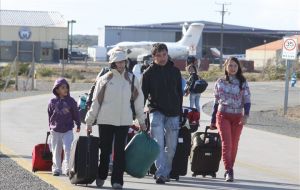MercoPress. South Atlantic News Agency
Sixty Percent of Visits Cancelled to Southern Chile
 Punta Arenas airport also remain blocked during the protest (Photo LPA)
Punta Arenas airport also remain blocked during the protest (Photo LPA) Seven days of protests and demonstrations, widespread international coverage, and dramatic warnings of violence in the Magallanes Region took their toll on the tourism industry in southern Chile’s Punta Arenas.
The region-wide protests over gas subsidy cuts that started Wednesday, Jan. 12, unleashed dramatic Internet alerts on social networking sites and travel forums. While tourists throughout the region struggled to find a way to leave, those who had pending reservations began canceling them, unsure how long the demonstrations would last.
“This was like a knife to the heart in the middle of the [high tourism] season,” Alejandro Solo de Zaldívar, head of the Magallanes Tourism Council, told El Mercurio. Many international embassies in Chile sent out travel advisory warnings, recommending that tourists avoid or delay travel to the region until the situation was resolved.
Torres Del Paine National Park, 250 miles from Punta Arenas, is the region’s most popular tourist destination, and one of Chile’s main attractions - 181,000 hectares of spectacular scenery, where most visitors set up camp and stay anywhere between a few hours and several days. While an average of 3,500 people visit the park every day, by the end of the protests only 70 people remained in the area.
“There were a lot of travel alerts on the internet,” Andrea Téllez, head of the region’s tourism office, told The Santiago Times. “[Lodging in] Torres del Paine had nearly 100 percent cancellation during the week of the protests.”
But the national park was not the only victim. The Magallanes Tourism Office calculates losses of US$6 million just from cancelled hotel reservations throughout the region; 60 percent of the region’s reservations were cancelled during the protests.
The effect on other services is still being measured.
After an agreement to end the protests was reached on Wednesday, the Magallanes Tourism Office is looking for a way to burnish the region’s image and bring back the tourists they lost.
“We have already sent word to all international media with offices in Chile, and private tour agencies,” said Téllez, who also explained that travel alerts were being changed in most embassies, after the national tourism office, SERNATUR, sent out a message.
Téllez noted that massive cancellations stopped Wednesday when the protests ended officially. “Things should start looking up from now on,” she said.
The high tourism season in Chile typically runs through the beginning of March, when the summer vacation season ends and the school year begins again.
By Ignacio Gallegos – Santiago Times




Top Comments
Disclaimer & comment rulesCommenting for this story is now closed.
If you have a Facebook account, become a fan and comment on our Facebook Page!